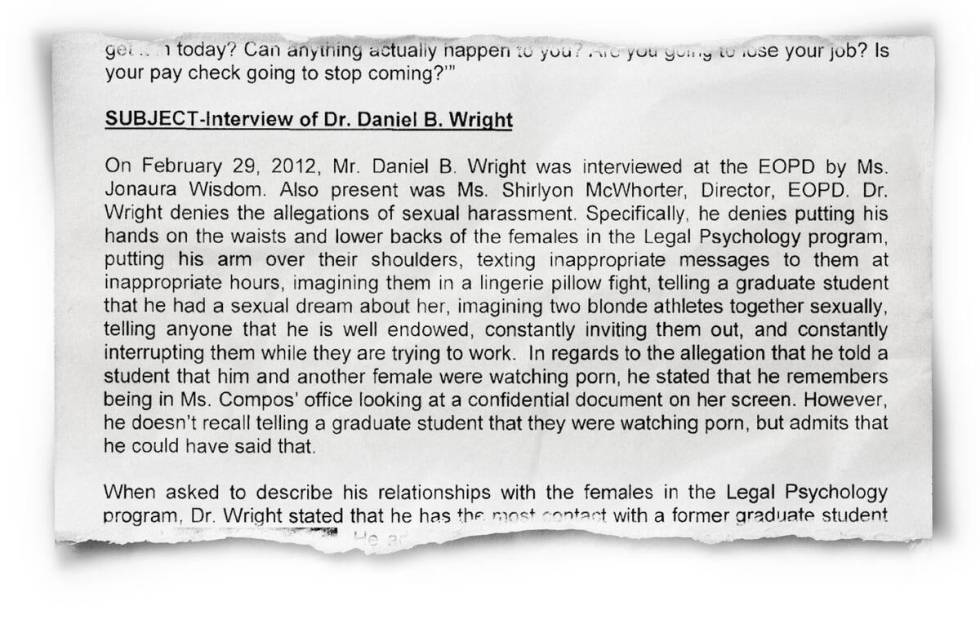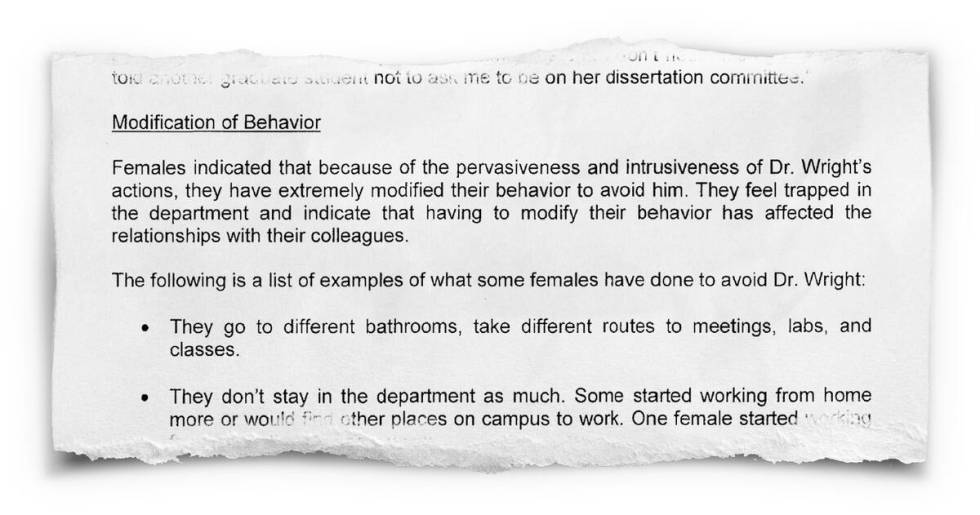UNLV professor was investigated at prior university for sexual harassment
A professor who was investigated a decade ago for sexual harassment and fostering a hostile work environment at a Florida university is now an endowed chair in UNLV’s College of Education.
Daniel Wright was the director of the legal psychology program at Florida International University in 2012 when he was investigated for making sexually inappropriate comments, stalking women in his department and creating an intimidating work environment for women, according to records provided to the Las Vegas Review-Journal by the university.
Interviews with approximately 10 people revealed “a level of inappropriate behavior and lack of professional judgment, involving women, that rises to the level of harassment based on their gender,” the investigation found.
Wright told the Review-Journal that he couldn’t speak to the specifics of the investigation and that he was told by FIU that he shouldn’t discuss it.
“That was a number of years ago,” he said. “I’m trying to get on with my life.”
On Friday, a spokesperson for FIU provided documents showing that Wright had resigned from his position with the university as of April 27, 2012, almost three months after the investigation took place.
Wright is now a professor and Dunn Family Endowed Chair in educational assessment at UNLV, which will welcome back students for the start of the fall semester on Monday.
After being asked if UNLV was aware of the investigation into Wright, a spokesperson said in a written statement Thursday that the university can only access personnel files during the hiring process for employees within the Nevada System of Higher Education and its institutions. The statement said Wright joined UNLV in the summer of 2019.
The Review-Journal spoke with two women who were interviewed for the Florida investigation, as well as a former male graduate student who said he witnessed Wright’s behavior.

The allegations
Approximately 10 people, including men, women, faculty and current and former graduate students, were interviewed for the investigation in 2012. Most of their names were redacted in the report.
Wright was involved with dissertation and thesis committees and had voting status regarding tenure at the time, according to the report.
Testimony from witnesses revealed a “pattern of sexually inappropriate comments and behavior spanning over time,” the report found.
Wright’s behavior in the workplace, according to witness accounts outlined in the report, included:
— Making references to his penis.
— Making comments about two graduate students being together sexually, telling one female graduate student that he had a sexual dream about her, or saying he had imagined one witness in a lingerie pillow fight.
— Texting women for inappropriate and non-work-related reasons, like saying he was thinking of them.
— Constantly interrupting women while they were working in their offices or repeatedly inviting them out for lunch or coffee, with witnesses stating that Wright “does not take ‘no’ for an answer.”
— Touching women without their permission, including by putting his hand on their waists or the smalls of their backs, or by putting his arm around their shoulders.
Witnesses also stated that Wright would attempt to get certain female graduate students alone with him, a tactic that one former male graduate student dubbed the “Dirty Dan Trick,” according to the report.
At the time of the report, Wright denied the allegations of sexual harassment, specifically denying that he touched women without their consent, texted inappropriate messages to them, imagined them in sexual situations, told students that he was well endowed or constantly interrupted them while they were trying to work.

According to the report, Wright’s behavior prompted women in the department to make changes to their own behavior to avoid him, going to lengths like taking different routes to meetings, working from home and parking in areas where they knew he wouldn’t park his car.
One woman said that if she heard steps near her office, she would stop typing so that no one knew she was in the office, in case it was Wright.
“I sneak in my office and turn my key as quietly as possible so that he doesn’t hear me come in,” the report quoted one woman as saying.
“A few days in the summer, I tried not wearing heels so my footsteps couldn’t be heard,” one recalled.

A woman who was interviewed for the report and who spoke to the Review-Journal on condition of anonymity said she experienced so many interruptions and invitations for coffee from Wright that it cut her work time in half. The woman requested she not be identified for fear of retaliation from Wright.
The woman said that if she declined an invitation from Wright, he would reply that “‘relationships are important in academic environments.’”
“He would kind of imply that he had power over me,” she said. “He monopolized my time, and we were there for his entertainment.”
Shari Schwartz, a former graduate student who was interviewed for the report, told the Review-Journal that she was never sexually harassed by Wright but witnessed his behavior and interruptions during her time in the legal psychology department.
Schwartz described the dynamic between Wright and his students as akin to “a king and his subjects.”
“You’ll entertain me until I decide you’re done for the day,” she said, describing his behavior. “I would stop going in. I don’t have time for the Daniel Wright show.”

Ultimately, the university found that Wright’s comments, invitations and behavior unreasonably interfered with the work of the women in the legal psychology program and that there was no evidence that Wright exhibited the same behavior toward men in the program.
“The more frequent the conduct the less severe it needs to be to create a hostile work environment,” the report states. “Dr. Wright’s numerous invitations, unwanted touching, constant interruptions, intimidating and inappropriate comments over the span of several years and involving numerous women show pervasiveness in his actions.”
Wright repeatedly told the Review-Journal he could not address the report’s specific findings. He also would not say whether he appealed the findings.
“It just wasn’t a pleasant place to be at for me, and perhaps for other people,” he said.
In response to a question about whether Wright had appealed the findings, an FIU spokesperson said in a written statement on Friday that the university did not have responsive documents.
Wright’s departure from FIU
Citing the apprehension and fear that Wright’s behavior created for the women involved and his position of authority, the university’s Office of Equal Opportunity Programs and Diversity recommended in its report that Wright be terminated from employment at FIU.
But that didn’t happen. Instead, Schwartz said, she was told that Wright would be transferred to a different campus.
Schwartz also said she had warned the director of her program against hiring Wright in the first place, after hearing stories about his behavior.
Following the investigation, and upon learning of Wright’s transfer, Schwartz said she and several other women spoke with the university’s general counsel and told her that Wright’s continued employment was a “lawsuit waiting to happen” for the university.
“I never imagined that FIU was like the Catholic Church,” Schwartz said. “You just move the problem from one place to another and just hope it doesn’t rear its ugly head.”
Shortly after her conversation with the university’s lawyer, Schwartz said, Wright separated from the university. She said her understanding was that it was a “mutual agreement.”
Wright said he continued to work in the same office following the investigation but left the university shortly after.
“My view then was I didn’t want to be at a place where I wasn’t wanted,” he said.
Sexual harassment in academia
Schwartz said she felt some level of relief following Wright’s departure from FIU but called it frustrating that he wasn’t ultimately fired.
“It really makes you walk away and say, ‘What does somebody actually have to do?’” she asked. “Did somebody actually need to be sexually assaulted or worse to take action?”
A 2018 report from the National Academies of Sciences, Engineering, and Medicine that examined the impact of sexual harassment in academia found that more than 50 percent of female faculty and staff and 20 to 50 percent of female students have encountered or experienced sexual harassment.
Women in science, engineering and medicine are at higher risk of experiencing sexual harassment because of the male-dominated environment and the organizational failure to take complaints seriously, sanction the perpetrators and protect the people filing the complaints, according to the report.
The cumulative effect of sexual harassment was a “costly loss of talent” in the fields of academic science, engineering and medicine.
“Women faculty in science, engineering, and medicine who experience sexual harassment report three common professional outcomes: stepping down from leadership opportunities to avoid the perpetrator, leaving their institution, and leaving their field altogether,” the report found.
Similar sentiments were echoed by the women from FIU who were interviewed as part of the investigation into Wright. Some of them reported feeling trapped in the department and indicated that having to modify their behavior had affected relationships with their colleagues.
Some women said they removed themselves from working on academic publications with Wright as a result of his behavior, according to the report.
Schwartz acknowledged that she was able to have her work published in high-impact academic journals as a result of Wright serving as her master’s thesis adviser.
“On one hand, he helped me further myself along as an academic,” she said. “This is part of the predatory behavior in my perspective. That’s how you make people beholden to you.”
She described the culture of academia, and in particular the tenure system — where college educators receive greater job security — as an antiquated, elitist mechanism that shelters people like Wright.
When asked if the report changed the way he conducts himself in professional settings, Wright said, “I’ve learned from all experiences I’ve had.”
“As each year passes I think I’m a better person,” he said.
FIU did not answer questions about what happens with investigations of sexual harassment once they are completed, or if it had changed its policies related to sexual harassment following the investigation into Wright.
In January, FIU’s then-president, Mark Rosenberg, abruptly resigned after an employee in her 20s said Rosenberg had been harassing her for months, according to reporting from the Miami Herald.
The 2018 report on sexual harassment in academia highlighted several solutions for universities to tackle sexual harassment, including enacting policies that specifically cover gender harassment, increasing transparency about how they are handling reports of sexual harassment, and providing more support for people to come forward.
“Institutions can take concrete steps to reduce sexual harassment by making systemwide changes that demonstrate how seriously they take this issue and that reflect that they are listening to those who courageously speak up to report their sexual harassment experiences,” the report’s authors wrote.
In Thursday’s statement, the UNLV spokesperson said the university does not comment on details that would be a part of an employee’s confidential personnel record.
But for the woman granted anonymity by the Review-Journal, FIU’s investigation into Wright showed just how many women had been affected by his behavior.
She said she came to understand that women deserve to be comfortable at work and have the right to control their own time.
“I think that he took that away from many women there,” she said.
Contact Lorraine Longhi at 702-387-5298 or llonghi@reviewjournal.com. Follow her at @lolonghi on Twitter.

















